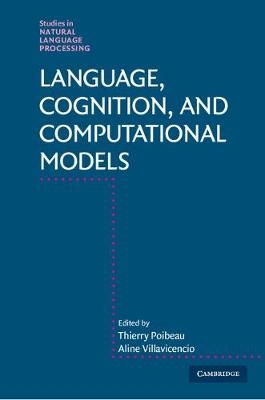
Language, Cognition, and Computational Models
Cambridge University Press (Verlag)
978-1-107-16222-8 (ISBN)
How do infants learn a language? Why and how do languages evolve? How do we understand a sentence? This book explores these questions using recent computational models that shed new light on issues related to language and cognition. The chapters in this collection propose original analyses of specific problems and develop computational models that have been tested and evaluated on real data. Featuring contributions from a diverse group of experts, this interdisciplinary book bridges the gap between natural language processing and cognitive sciences. It is divided into three sections, focusing respectively on models of neural and cognitive processing, data driven methods, and social issues in language evolution. This book will be useful to any researcher and advanced student interested in the analysis of the links between the brain and the language faculty.
Thierry Poibeau is Director of Research at Centre National de la Recherche Scientifique (CNRS), Paris and head of the LaTTiCE laboratory in Paris, France. His is also an affiliated lecturer at the Department of Theoretical and Applied Linguistics (DTAL) of the University of Cambridge. He works on natural language processing (NLP), in particular focusing on information extraction, question answering, semantic zoning, knowledge acquisition from text, and named entity tagging. Aline Villavicencio is a Reader at the Institute of Informatics, Universidade Federal do Rio Grande do Sul, Brazil, and is a fellow of CNPq (Brazil). Her research interests in natural language processing are in computational models of acquisition of linguistic information from data, distributional semantic models, multiword expression, and applications like text simplification and question answering.
Part I. About This Book: 1. Introduction T. Poibeau and A. Villavicencio; Part II. Models of Neural and Cognitive Processing: 2. Light-and-deep parsing P. Blache; 3. Decoding language from brain B. Murphy, A. Fyshe and L. Wehbe; 4. Graph theory applied to speech N. B. Mota, M. Copelli and S. Ribeiro; Part III. Data-Driven Models: 5. Putting linguistics back into computational linguistics M. Kay; 6. A distributional model of verb-specific semantic roles inferences G. E. Lebani and A. Lenci; 7. Native language identification on EFCAMDAT X. Jiang, Y. Huang, Y. Guo, J. Geertzen, T. Alexopoulou, L. Sun, A. Korhonen; 8. Evaluating language acquisition models L. Pearl and L. Phillips; Part IV. Social and Language Evolution: 9. Social evolution of public languages A. Reboul; 10. Genetic biases in language R. Janssen and D. Dediu; 11. Transparency versus processing efficiency R. van Trijp.
| Erscheinungsdatum | 27.01.2017 |
|---|---|
| Reihe/Serie | Studies in Natural Language Processing |
| Verlagsort | Cambridge |
| Sprache | englisch |
| Maße | 158 x 235 mm |
| Gewicht | 600 g |
| Themenwelt | Geisteswissenschaften ► Psychologie ► Allgemeine Psychologie |
| Geisteswissenschaften ► Psychologie ► Verhaltenstherapie | |
| Geisteswissenschaften ► Sprach- / Literaturwissenschaft ► Sprachwissenschaft | |
| Informatik ► Theorie / Studium ► Künstliche Intelligenz / Robotik | |
| ISBN-10 | 1-107-16222-X / 110716222X |
| ISBN-13 | 978-1-107-16222-8 / 9781107162228 |
| Zustand | Neuware |
| Informationen gemäß Produktsicherheitsverordnung (GPSR) | |
| Haben Sie eine Frage zum Produkt? |
aus dem Bereich


